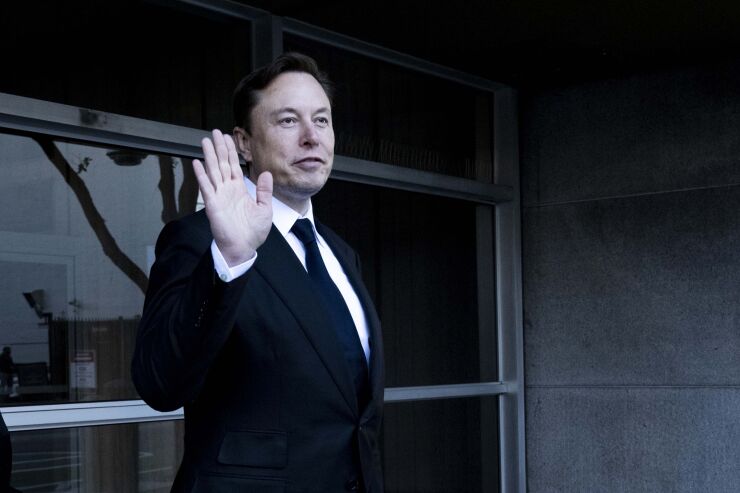(Bloomberg) --A California judge presiding over a wrongful death lawsuit against Tesla Inc. found it "deeply troubling" that the electric-car maker claims videos of Elon Musk touting Autopilot may not actually be real.
Confronted with Tesla's refusal to rule out that some clips could be digitally altered deep fakes and therefore not suitable as evidence, the judge came up with an elegant solution: Put the billionaire entrepreneur and artificial intelligence enthusiast under oath and have him testify as to which statements coming out of his mouth are authentic.
Thursday's order by Santa Clara County Superior Court Judge Evette Pennypacker is a watershed moment in the escalating controversy over Tesla's driver-assistance technology.
Tesla and Musk are under legal pressure from consumers, investors, securities regulators and federal prosecutors questioning whether the company has over-hyped its progress toward self-driving vehicles during the last eight years. Tesla also is in the thick of multiple probes by the National Highway Traffic Safety Administration over possible defects in Autopilot linked to at least
The three-hour deposition of Musk ordered by the judge — though very limited in scope — will put him on the record for the first time vouching for public statements he's made since 2014 promoting Tesla's technology in media interviews, blog posts and tweets. Musk may be also be asked to authenticate a 2016 video that exaggerated the abilities of Autopilot — in which he dictated the opening text that claimed the company's car drove itself.
The stakes couldn't be higher.
Just this month in a conference call with investors, Musk
The electric-car maker successfully challenged an effort to make Musk testify in a Florida Autopilot fatal crash suit. But Pennypacker concluded at a hearing Thursday there's no other way to move forward in a case brought by the family of a Tesla 2017 Model X driver who died in a 2018 highway crash into a concrete barrier about 45 minutes south of San Francisco.
In a
"Their position is that because Mr. Musk is famous and might be more of a target for deep fakes, his public statements are immune," the judge wrote. "In other words, Mr. Musk, and others in his position, can simply say whatever they like in the public domain, then hide behind the potential for their recorded statements being a deep fake to avoid taking ownership of what they did actually say and do."
While judges often spare chief executive officers and other high-ranking officials from having to give depositions, Pennypacker rejected Tesla's proposal to let Musk address questions in writing, noting that attorneys in the case had already run into dead ends with that approach.
But the judge did excuse Musk from having to travel to give his deposition, saying he can do it virtually from his home in Texas, and said he can only be asked to verify that it was actually him in the videos — and can't be questioned about the substance of his statements.
"This is not a free for all to ask about everything," Pennypacker told lawyers.
"The questions that have not been answered are: 'Is that you with Gayle King?'" she said, referring to a
Tesla's lawyer, Tom Branigan, told the judge the company didn't mean to suggest the videos are deep fakes, but "we raised this idea, this issue, because we're living in a world today where these things exist."
The lawsuit brought by the family of Walter Huang, who was an Apple Inc. engineer, is set for trial on July 31. The family claims the Autopilot system malfunctioned while Huang was on his morning commute and steered his car into the median.
According to Tesla, Huang's hands were not detected on the steering wheel multiple times during the 19 minutes leading up to the crash, during which Autopilot issued two visual and one audible alert for hands-off driving. Huang was playing the video game Three Kingdoms on his phone at the time of the crash, according to an investigation by the National Transportation Safety Board.
Attorney Doris Cheng, who's representing the Huang family, told the judge the back and forth so far with Tesla over Musk's statements "has been very consuming."
Lawyers for the Huangs argued that Tesla failed to adequately respond to their demands for information during the pretrial discovery process and asked the judge to sanction the company.
But Pennypacker denied that request.
"It is clear to the court that Tesla made efforts to respond to plaintiffs' discovery requests," she wrote. "In some cases, plaintiffs simply do not like the answers received."
The case is Huang v. Tesla Inc., 19CV346663, California Superior Court, Santa Clara County (San Jose).
(Updates with judge's ruling during hearing.)
--With assistance from Dana Hull and Robert Burnson.






